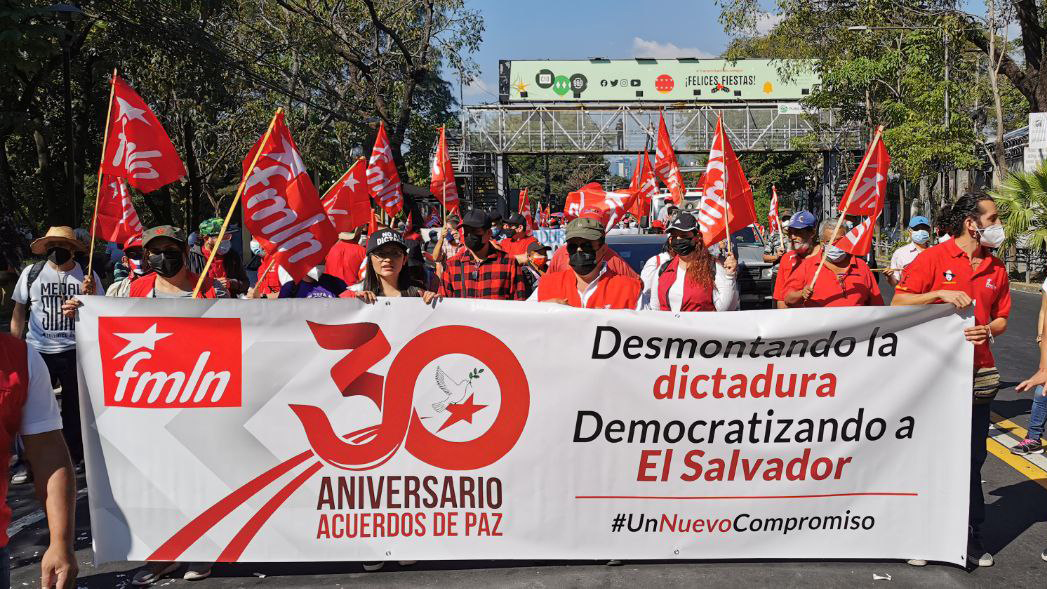January 16 marked 30 years since the signing of peace accords between the government of El Salvador and the Farabundo Martí National Liberation Front (FMLN) guerilla group, ending 12 years of civil war. The Chapultepec peace accords paved the way for a transition to democracy after decades of military administrations.
This past Sunday, citizens from across the country traveled to the capital, San Salvador, to commemorate the 30th anniversary of the historic agreements, despite the attempts by the far-right government of president Nayib Bukele to discredit the peace agreements and prevent the celebrations. In the morning, members and supporters of the FMLN party held a commemorative act at the Peace Monument, which commemorates the peace accords of 1992. Hours later, thousands of citizens, members of social movements, civil society organizations, and progressive political forces took part in a peaceful march from the Cuscatlán Park to the Plaza Gerardo Barrios in central San Salvador to honor the struggle for peace and democracy.
Ningún régimen podrá derrumbar NUESTRA HISTORIA. Hoy debemos estar MÁS UNIDOS QUE NUNCA.
🚩✊#SinMiedoYDeFrente#AcuerdosDePaz#VencimosYVenceremos pic.twitter.com/bj5ZKYDOJa
— FMLN Oficial (@FMLNoficial) January 17, 2022
The participants of the march condemned the installation of police and military checkpoints at various points across the country to prevent them from arriving in the capital. Numerous social leaders criticized security officials for specifically targeting buses carrying members of social movements traveling to join in the march.
The protesters also rejected the approval of an initiative to change January 16 from the “National Day of Peace” to “National Day of the Victims of the Armed Conflict”. On January 11, the legislative assembly, dominated by the ruling NI-GANA alliance, repealed the decree that had established January 16 as the day of commemoration of the peace agreements. Bukele’s administration promoted the legal change, arguing that the peace accords were a “farce” and a “corrupt pact.” The government maintained that those who fought in the civil war should not be commemorated, only their victims.
Bukele's security forces erected checkpoints around the perimeter of San Salvador and stopped buses transporting social movements from the departments to the capital where an anti-government mobilization was taking place. pic.twitter.com/SI65wPXBXH
— Kawsachun News (@KawsachunNews) January 17, 2022
Óscar Ortiz, the secretary general of the FMLN, stressed that “history cannot be erased with this kind of thing. It does not end with this type of procedure, far from it, you don’t want to distort the history. You don’t want to erase it on the basis of establishing a rule. It is a message where blood, sacrifice, persecution, torture, imprisonment are despised.”
With regard to the militarization of the outskirts of the capital, Ortiz said that “it is a cheap and shocking way of wanting to address the issues of El Salvador,” and highlighted that “the lesson that the peace accords leave us is that the best thing that can happen to El Salvador is to continue walking along the democratic route.”
La celebración de los #AcuerdosDePazSv nos une como país, aunque muchos quisieran borrar ese logro histórico y dividirnos, no lo lograrán.
Podemos pensar distinto, pero tenemos clara #CualEsLaRuta pic.twitter.com/JaRSo87iOz
— Anabel Belloso (@AnabelBelloso) January 17, 2022
Salvadoran civil war
The Salvadoran civil war began on October 15, 1979, after a US-backed military coup overthrew left-wing president Carlos Humberto Romero. Tens of thousands of citizens, progressive forces and organizations took to the streets in rejection of the coup and the atrocities committed by the new military regime. The five largest left-wing forces, Farabundo Martí People’s Forces of Liberation (FPL), Communist Party of El Salvador (PCES), National Resistance (RN), People’s Revolutionary Army (ERP), and the Revolutionary Party of the Central American Workers—El Salvador (PRTC) organized to fight US imperialism. Nearly one year after the coup, on October 10, 1980, the five organizations came together to form the FMLN, and to continue their struggle against the military junta.
Around 20,000 civilians were killed during the three year rule of the junta. After twelve years of civil war, between 70,000 and 80,000 people were killed and more than 8,000 disappeared. Over one million people, almost a fifth of the country’s population, were displaced.
After over seven years of negotiations, beginning in October 1984, a set of peace agreements were signed between the right-wing government and the left-wing FMLN on January 16, 1992, in Chapultepec Castle, Mexico. The agreements addressed social changes in five fundamental areas: modification of the Armed Forces and demobilization of all armed FMLN units; replacement of the National Guard with the National Civil Police; modifications to the judicial system and the defense of human rights; modification to the electoral system; and the adoption of measures affecting the economic and social fields. The agreements ushered in institutional and legal reforms that allowed El Salvador to become a functioning democracy.
30 years ago, El Salvador took the important step of negotiating an end to its internal armed conflict.
The @UN is proud to have helped Salvadorans pave the way towards peace, which must be protected and built on every day.
— António Guterres (@antonioguterres) January 16, 2022





